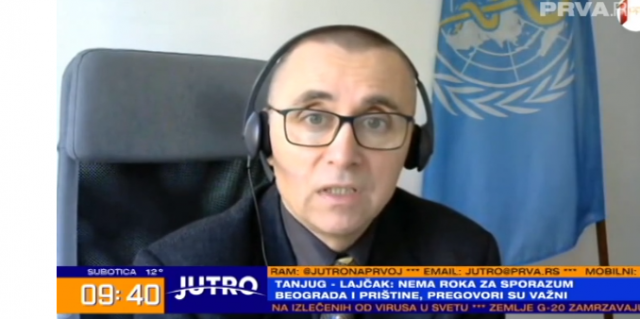Ivanuša: We may have a more difficult epidemiological situation than we've had so far
It is important that citizens get vaccinated as soon as possible, the head of the Office of the World Health Organization in Serbia, Dr Marjan Ivanuša stated.
Saturday, 23.01.2021.
13:01

Ivanuša: We may have a more difficult epidemiological situation than we've had so far
He adds that it is only a matter of time before a new strain of the coronavirus, which is spreading faster among people, appears in Serbia as well, and which could lead to a worsening of the epidemiological situation.Ivanuša told Tanjug that the current epidemiological situation is much better than it was in December last year, but that there is still a large number of new infections on a daily basis and that patients are still dying.
"Measures, distance, hygiene should continue to be adhered to. Now we have a new hope and that is the vaccine. I hope that in a few months we will slowly return to a normal life", Ivanuša said.
He states that vaccination is important as long as there are people who are susceptible to the virus, and all those who have not recovered from COVID-19 or have not been vaccinated are susceptible. "The virus is spreading rapidly among people who are sensitive. Especially if we think of a new strain of virus that spreads more easily among humans than the basic type of virus. That means that we can have a more difficult epidemiological situation than the ones we have seen so far, "he pointed out.
He explains that the vaccine prevents infection, i.e. the disease, and that all vaccines against coronavirus that have received certificates have been proven to be effective and safe.
Asked whether it is important which vaccine the citizens will be vaccinated with, since there are currently three vaccines available in Serbia, Ivanuša said that they can opt for any vaccine approved by the Medicines and Medical Devices Agency of Serbia and that the most important thing is to get vaccinated.
"The WHO's position is clear - only vaccines that are effective and safe should be used. For vaccines used in Serbia, their temporary use was allowed by the Medicines and Medical Devices Agency of Serbia (ALIMS). We know that ALIMS is a strong agency and that we can rely on its decisions. I don't see any big differences between vaccines. People can choose one or the other. The most important thing is to get vaccinated", he stated. The first research done regarding mutations in the coronavirus shows, says Ivanuša, that the vaccines in use are effective against a new strain of the virus.
He explains that mutations will continue in the future and that the situation must be monitored to see if the effectiveness remains or if minor changes are needed in the vaccine.
"So, we don't know that yet, but for those viruses that are currently circulating, vaccines are effective," explains the head of the WHO Office in Serbia.
Asked whether the pace of mass vaccination in Serbia is good, he said that it is and that if 30.000 people are vaccinated daily, counting two doses of vaccines, it means that three million people could be vaccinated in Serbia in six months.
"Vaccination is a required logistical process. This is not so simple, especially if three different vaccines with different storage conditions are used in parallel. "The organization of vaccination is one part, and the other is the interest of people, which is good," he stated.
When asked when vaccines can be expected through the COVAX program, Ivanuša said that the program is working "at full speed" and that they expect that by the end of March, about 150 million doses of vaccines will be distributed to countries through that initiative.
"Then, by the end of June, we expect a total of more than 600 million doses to be distributed, and by the end of this year, more than two billion doses. COVAX also faces the same problems as each individual country, that there is not enough vaccine available and that there is great interest and great demand for vaccines," he explains.
Some countries, he explains, have concluded bilateral agreements with vaccine manufacturers for quantities that are too large for those countries and will not be able to consume them. "We expect that these countries, and some are already doing so, will provide certain quantities of vaccines to either COVAX or other countries through various bilateral agreements," he said.
He reminds that the EU decided to help in the procurement of vaccines to the countries in the Western Balkans, and that they provided 70 million euros for that purpose.


























































Komentari 0